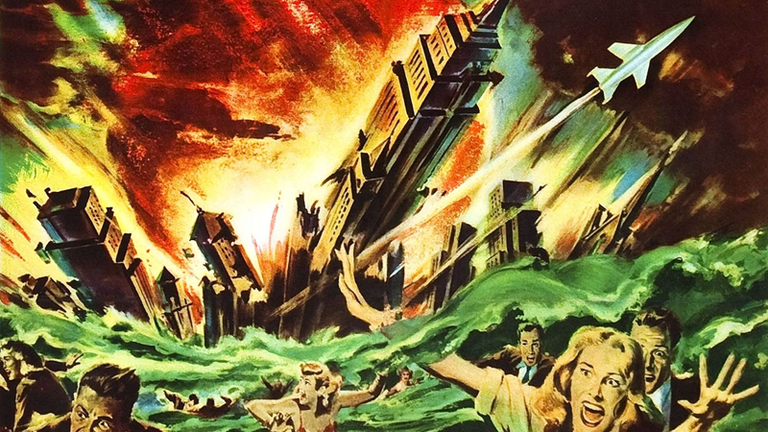American cinema's fetish for trying to destroy the Earth.

Hollywood has always had (still has and probably always will) a particular pleasure in creating movies that have as their main focus the countless types of threats that are determined to invade (and destroy) our planet. Being an extremely popular target, Earth ends up being the final destination of these threats, which are not always from other galaxies (it is worth mentioning that we, human beings, can also act as destructive monsters).
No other cinema around the world has managed to make more movies about countless global catastrophes than American cinema. Considering the financial monopoly within the movie industry, I even think it is somewhat obvious that the predominance of American cinema happens, but this terrible obsession with looking at planet Earth as a constant “damsel in distress” is something increasingly generic and often unnecessary.

In any case, exploring United States cinema it is extremely easy to see how our planet works as a huge “case study” on the human (or inhuman) actions that surround us. We are those responsible for building, but not ironically, we are also those responsible for destroying. Sometimes movies (in general) manage to bring this out in an emblematic way, but most of the time it's nonsense.
Considering such a vast scenario as just a potential platform to be destroyed only shows how precarious the work of many American screenwriters and filmmakers is. Living within their own bubbles, they forget to look at the Earth with a more immersive look, thus ignoring themes that are really important in order to have an increasingly larger space within this reality that can be created (and spread) through the cinematic universe.

Honestly, I still can't understand how American cinema (in particular) manages to stay so stuck with this theme for so many decades. Yes, I know that all of this still works, and that it also still generates great box office sales around the world. However, to the detriment of the essence of this art, is it really worth putting money above what these movies should be? Thinking about it as a true cinephile, this is quite demotivating.
The well-known “event cinema” (in general, those that are damaged by major catastrophes) is a landmark within Hollywood. Unfortunately, this is not going to end, but if only projects were thought of and carried out with a little more attention (and especially with more relevance within their messages and meanings), everything would certainly be very different. I'm not against this type of cinema, but there needs to be a place for everyone.
Hollywood siempre ha tenido (todavía tiene y probablemente siempre tendrá) un placer particular en crear películas que tengan como foco principal los innumerables tipos de amenazas que están decididas a invadir (y destruir) nuestro planeta. Al ser un objetivo sumamente popular, la Tierra termina siendo el destino final de estas amenazas, que no siempre provienen de otras galaxias (cabe mencionar que nosotros, los seres humanos, también podemos actuar como monstruos destructivos).
Ningún otro cine del mundo ha logrado hacer más películas sobre innumerables catástrofes globales que el cine estadounidense. Considerando el monopolio financiero dentro de la industria cinematográfica, creo incluso que es un tanto obvio que el predominio del cine estadounidense se da, pero esta terrible obsesión por mirar al planeta Tierra como una constante “damisela en apuros” es algo cada vez más genérico y muchas veces innecesario.
En cualquier caso, explorando el cine estadounidense es sumamente fácil ver cómo nuestro planeta funciona como un enorme “caso de estudio” sobre las acciones humanas (o inhumanas) que nos rodean. Somos los responsables de construir, pero no irónicamente, también somos los responsables de destruir. A veces las películas (en general) logran resaltar esto de una manera emblemática, pero la mayoría de las veces es una tontería.
Considerar un escenario tan vasto como una mera plataforma potencial a destruir sólo muestra cuán precario es el trabajo de muchos guionistas y cineastas estadounidenses. Al vivir dentro de sus propias burbujas, se olvidan de mirar la Tierra con una mirada más inmersiva, ignorando así temas realmente importantes para tener un espacio cada vez más grande dentro de esta realidad que puede crearse (y difundirse) a través del universo cinematográfico.
Honestamente, todavía no puedo entender cómo el cine estadounidense (en particular) logra permanecer tan atascado en este tema durante tantas décadas. Sí, sé que todo esto todavía funciona y que además sigue generando grandes ventas de taquilla en todo el mundo. Sin embargo, en detrimento de la esencia de este arte, ¿realmente vale la pena poner el dinero por encima de lo que deberían ser estas películas? Pensándolo como un auténtico cinéfilo, esto resulta bastante desmotivador.
El conocido “cine de eventos” (en general, aquellos que resultan perjudicados por grandes catástrofes) es un referente dentro de Hollywood. Lamentablemente esto no va a terminar, pero si los proyectos fueran pensados y llevados a cabo con un poco más de atención (y sobre todo con más relevancia dentro de sus mensajes y significados), seguro que todo sería muy diferente. Yo no tiengo nada contra de este tipo de cine, pero tiene que haber un lugar para todos.
Desde sempre, Hollywood teve (ainda tem e provavelmente sempre terá) um prazer particular em criar filmes que tem como seu principal foco os incontáveis tipos de ameaças que estão determinadas a invadir (e destruir) o nosso planeta. Sendo um alvo extremamente popular, a Terra acaba sendo o destino final dessas ameaças, que aliás nem sempre são de outras galáxias (aqui vale mencionar que nós, seres humanos, também podemos agir como monstros destruidores).
Nenhum outro cinema ao redor do mundo conseguiu fazer mais filmes sobre as incontáveis catástrofes globais do que o cinema americano. Considerando o monopólio financeiro dentro da indústria cinematográfica, eu até acho que é um tanto quanto óbvio que a predominância do cinema estadunidense aconteça, mas essa terrível obsessão em olhar para o planeta Terra como uma constante “donzela em perigo” é algo cada vez mais genérico e muitas vezes desnecessário.
De qualquer maneira, explorando o cinema dos Estados Unidos é extremamente fácil perceber como o nosso planeta funciona como um enorme “estudo de caso” sobre as ações humanas (ou inumanas) que nos cercam. Somos aqueles responsáveis por construir, mas não ironicamente, também somos os responsáveis por destruir. Alguma vezes os filmes (de uma maneira geral) conseguem trazer isso de maneira emblemática, mas na maior parte das vezes é algo nonsense.
Considerar esse cenário tão vasto apenas como uma plataforma em potencial para ser destruída apena denota o quão precário é o trabalho de muitos roteiristas e cineastas americanos. Vivendo dentro de suas próprias bolhas, esquecem de olhar para a Terra com um olhar mais imersivo, ignorando assim temáticas que realmente são importantes para ter um espaço cada vez mais maior dentro dessa realidade que pode ser feita (e espalhada) pelo universo cinematográfico.
Sinceramente, eu ainda não consigo entender como o cinema americano (em especial) consegue ficar tão preso a essa temática por tantas décadas. Sim, eu sei que tudo isso ainda funciona, e que também ainda rende ótimas bilheterias ao redor do mundo. No entanto, em detrimento da essência dessa arte, será que vale à pena mesmo colocar o dinheiro acima do que esses filmes deveriam ser? Pensando enquanto um verdadeiro cinéfilo isso é algo bastante desmotivador.
O conhecido “cinema evento” (em geral, aqueles que são corroídos por catástrofes de grandes proporções) é um marco dentro de Hollywood. Infelizmente, isso não deve acabar, mas se ao menos os projetos fossem pensados e realizados com um pouco mais de atenção (e principalmente com mais relevância dentro de suas mensagens e significados), tudo certamente seria muito diferente. Eu não tenho nada contra esse tipo de cinema, porém é preciso haver um lugar para todos.
Posted Using InLeo Alpha
Obrigado por promover a comunidade Hive-BR em suas postagens.
Vamos seguir fortalecendo a Hive
Your post was manually curated by @Shiftrox.
Delegate your HP to the hive-br.voter account and earn Hive daily!
🔹 Follow our Curation Trail and don't miss voting! 🔹
Congratulations @wiseagent! You have completed the following achievement on the Hive blockchain And have been rewarded with New badge(s)
Your next payout target is 45000 HP.
The unit is Hive Power equivalent because post and comment rewards can be split into HP and HBD
You can view your badges on your board and compare yourself to others in the Ranking
If you no longer want to receive notifications, reply to this comment with the word
STOPCheck out our last posts:
while i certainly did not celebrate on 9/11 there was this odd feeling off 'well, something like this in new york was bound to happen. you have been showing it to people for decades in most blockbusters."
if images held by a collective hold a certain power, then certainly mass marketed distopic movies will have an effect one way or another.
i loved many of those movies when i was younger. but now i see them largely as hypnotic prompts to create a self-fulfilling prophecy. i might be wrong of course!
great writeup again dude!
I think it feels more like trying to create a villan to elevate as a hero.
While brainwashing others that they need the hero.
!ALIVE
@wiseagent! You Are Alive so I just staked 0.1 $ALIVE to your account on behalf of @ littlenewthings. (1/10)
The tip has been paid for by the We Are Alive Tribe through the earnings on @alive.chat, feel free to swing by our daily chat any time you want, plus you can win Hive Power (2x 50 HP) and Alive Power (2x 500 AP) delegations (4 weeks), and Ecency Points (4x 50 EP), in our chat every day.
